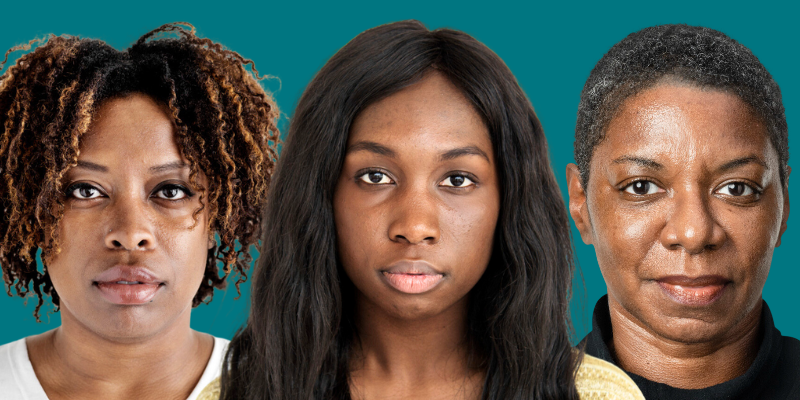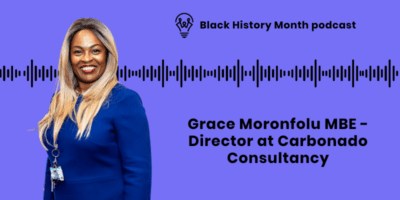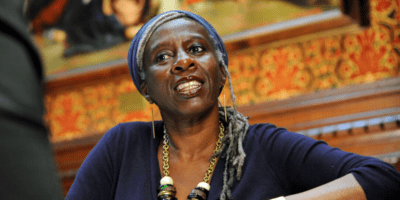Ellie Ikiebe is a partnerships and programmes manager with the operations team at the Runnymede Trust. Ellie manages the Runnymede trainee scheme, Unbound, with oversight over training programme management, partner engagement, and trainee development. She also provides advisory support to organisations on internal policy and staff training, as well as contributing to research projects centred around culture and the arts.
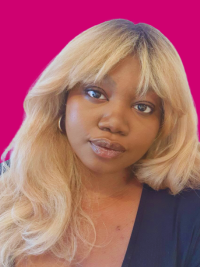
“History is one of those unique facets of our education where, yes, there’s a lot of facts, there are dates, there are historical figures, but there’s also narrative. Sometimes the lack of narrative, from those who are missing from the story, says so much.”
An unconventional journey
My journey into the world of work is quite unconventional. You might say I took a bit of a scenic route to end up where I am today. I did a degree followed by an internship and then started a job in a think tank. In 2019 I had the very good fortune to join a women’s empowerment group called You Make It. I look at my life as before and after that really great intervention. I had been to uni twice but, for me, it hadn’t been the best environment to allow me to thrive at the time.
You Make It really changed that. It allowed me to blossom in a new space over six months. I then went on to do a year-long placement with a cultural heritage traineeship called the New Museum School. I then worked at the National Trust for about a year.
My placement was from 2020 into 2021, during the pandemic, so it was quite a dramatic time in cultural heritage with a lot of the conversations that were resurfacing around Black Lives Matter. I’d always been involved in those conversations, even before getting into them in a work setting. After doing my placement I had the good fortune to be able to work on producing a podcast and putting together an event to help bridge a lot of the gaps within that cultural heritage conversation.
Paying it forward
At this point I found an opportunity to join the Runnymede Trust, helping to put together our own leadership programme, called Unbound, for talented individuals from backgrounds that are underrepresented in the third sector and think tanks, specifically from Black and minoritised backgrounds, as well as working-class backgrounds, so they can have an entry point into this world of work.
We’ve run two cohorts so far, and being involved has been absolutely amazing. Our transformative programme provided core training and holistic development over 11 months and created a more sustainable model for retaining trainee talent within the organisation and wider sector.
The programme aligns with my own personal values of paying it forward. So, if you’ve had the good fortune to make your way into something career-wise, then how can you pay it forward to help somebody else who should also have a seat at the table, but might not have a way in otherwise.
Overcoming racial inequality
The Runnymede Trust was established in 1968. We are the UK’s leading independent race equality think tank and we produce authoritative, evidence-based interventions to overcome racial inequality.
We’re at the forefront of the race equality discourse. We are rare in this space. Our team is made up of lived-experience staff. This means we are able not only to reflect the experiences of our communities and our work more directly, but we are also very close to these issues, so the reports we produce, the policy interventions we champion, are all informed from a place of knowing. They are also backed up by well-researched evidence.
We cover a variety of areas. We’re very strong in the arts space but our work is very diverse. One of the things we did in 2020 was to help expose the Windrush scandal. Our work is rooted in challenging structural racism and knowing that is going to directly impact our community. That’s what drives and motivates us.
Structural racism is where there are systemic barriers in place, whether that be laws, rulings, any of those sorts of things that have existed and been passed down and almost hardwired into a variety of sectors, negatively impacting or creating inequality for Black and Brown communities.
There are many intersections to it, so it may relate specifically to race or it could be a combination of race and gender, or it could include class and religion too. Systemic racism means that it’s not there by accident or fluke. It also means that you have to be very deliberate and intentional about how you dismantle it in order to create equitable solutions for those communities that have been negatively impacted and disadvantaged for a long time because of those structures.
Day-to-day work
For our partnerships work, day-to-day, that’s really about how we connect with our support network, so I reach out to those who have supported us, whether through donations or our projects or anything like that. I make sure we’re maintaining those relationships and also forming new ones. We’ve had some incredible support for more than 50 years so it’s about consistently building on that over time.
On the programme side of things, as I mentioned earlier, I’m usually managing Unbound, our leadership programme, but we’re on a break at the moment. Normally on a day-to-day basis, I would be ensuring that our cohort of trainees are having the best experience with our organisation, and our line managers, and also making sure that they are developing and checking in with the external organisations we work with to make the programme what it is.
One of our projects, called Lit In Colour, is a project to expand the texts learnt and taught in English Literature. Around 70% of the young people who took part in that nationwide research expressed their view that diversity was an integral part for society and should be represented in their school curriculum. The research, carried out by colleagues at the University of Oxford, and published in 2021, revealed that less than one per cent of candidates for GCSE English literature had answered a question on a book by an author of colour.
View this post on Instagram
For Lit in Colour, working in collaboration with members of the advisory board, we have established practical ways to address this necessity to broaden the English curriculum and support exam boards with the recent text changes they have made. In 2022, we also campaigned at an APPG [all-party parliamentary group] event, alongside a senior leader, academic and an exam board representative to encourage members of the UK Government to diversify the English curriculum at all levels of education.
Since we reported in June 2021, we’ve donated thousands of books to schools nationwide, supported exam boards to create resources to support the learning and teaching experience of the new texts added to their specifications. So, there continues to be a line from understanding what the issue is, how it’s impacting our community, researching it, providing the evidence to make the case, and then influencing the solutions and impacting teachers and students. Thus, understanding how inequality works is crucial if we want to dismantle or imagine different futures for affected communities. This is precisely why the work of Runnymede is so important. Through our research, policies, and programmes, we aim to spread awareness of what is happening in our most affected communities and bring about positive change.
Black history is British history and it is world history
Black History Month is very important for a variety of reasons. Obviously, Black History Month should be every month of the year but having it specifically for one month where we condense our focus allows us to prioritise it so it can’t be ignored or sidelined.
Black History Month gives us a platform to teach Black history. Black history is British history, and it is world history. These are not mutually exclusive and in order for us to teach the most well-rounded, accurate history, we have to teach Black history.
Black History Month brings this to the forefront of people’s minds. Teaching Black history is so important as well because it also means that no child is left behind, it also gives the best quality of education because everyone gets a really well-rounded view of the world. I think what we all want is the best quality of education for our children.
Teaching our shared history is vital, not just for relaying accurate history, but it’s also crucial in building up empathetic adults’ understanding of our shared history, both the good and the more difficult parts. This then, in turn, helps young people today better understand the world that they live in.
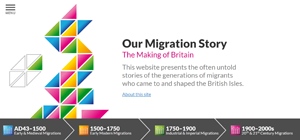
Celebrating shared histories
Black History Month can also be celebratory, it can be empowering, and it can also benefit every student as well, irrelevant of their ethnicity, to really celebrate shared histories. This is why Black History Month should be seen in its totality and not just as the month where we highlight specific segmented pieces of Black history and stories pre-Windrush. What we need to do is to accurately reflect history before colonialism, during colonialism and after. Windrush should also be highlighted as a significant migration story. All of these things are so important for building up an accurate and robust timeline.
History is a shared human story in which we should invite children to participate, to understand their place within it, because representation is inspiring, to be able to see yourself vividly in stories. Telling these human stories to help develop children’s knowledge means they grow up into empathetic adults so that, hopefully, we won’t repeat the mistakes of the past, such as the Windrush scandal, because it won’t feel like it’s ‘this other person’s experience’ rather than ‘mine’.
History is one of those unique facets of our education where, yes, there’s a lot of facts, there are dates, there are historical figures, but there’s also narrative. Sometimes the lack of narrative, from those who are missing from the story, says so much.
Black History Month is about correcting that. It’s not about removing anyone from the story, it’s about including and putting people back in and filling out the gaps. Those blanks are incredibly demoralising, in terms of mental health and care aspects, for children, for young people, and even for those schooling young people. Those missing gaps and parts aren’t just missing gaps and parts of the story, it’s the missing pieces themselves.
All of these interventions are about putting back those missing pieces for teachers and students, and I think that, as a society, we would be so much better off building and empowering young, well-rounded adults who have all of their stories and their history intact. Then they can go on and do inspiring things from there. That doesn’t have to come at the expense of anybody else, because it’s rooted in empathy and it’s rooted in the desire for everyone to have a space in this human story.
Celebrating Our Sisters
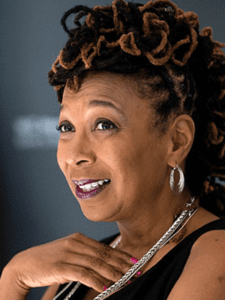
The theme of this history month is Celebrating Our Sisters, Saluting Our Sisters. This theme is dear to me as a Black Woman and history and culture enthusiast. For too long, Black women’s key role in shaping history and culture, leading and inspiring change, and building communities have been left out of our stories. This BHM is an opportunity to begin to intentionally focus on redressing this imbalance. Why is it important? Due to how race, gender, and class intersect, Black Women have a unique experience of race, gender or class. Kimberlé Crenshaw coined the phrase ‘intersectionality’ to describe this experience, and it’s this intersectionality that creates a unique vantage point in understanding inequality and change.
This theme allows us to explore the lineage of ideas, concepts, experiences, and expressions of freedom by influential women in movements such as Sojourner Truth, Ida B. Wells, bell hooks, Ayesha K. Faines, Nikki Giovanni, Kath Locke, and Malorie Blackman OBE, as well as groups like Manchester Black Women’s Co-operative and Brixton Black Women’s Group. It takes us on a transformative journey that encourages us to consider multiple perspectives simultaneously. The Blue plaque that’s been placed to celebrate the life and work of Claudia Jones and the recognition of the work of community leader Yvonne Field this year are steps in the right direction that must continue past this year and this BHM.
Lastly, this theme is important, especially in the face of stories like Child Q, the more recent stories like the Peckham incident, the tragic loss of Elianne Andam and all the harrowing moments that didn’t make the mainstream news. This theme has broader importance because it says to Black girls, women and the wider society — we matter. That is a healing message that should be spread far and wide. #WeMatter
Get involved
There are so many ways that the Womanthology community can support us. The Runnymede Trust has been running for over 50 years but we rely heavily on the support of, our networks and people who really see the value in what we do. We’d love your help with keeping up the momentum with the changes that have been really hard-won.
At the simplest level, it would be incredibly helpful for your community to keep in touch with our campaigns and help amplify our messaging on social media. Donations are most welcome.
Please do get in touch too if you are at an organisation you feel would benefit from supporting our work. We work in partnership will all kinds of like-minded organisations, creating impactful and evidence-based solutions to extend your reach.
We had a massive growth of support in 2020 and 2021, when so many of the inequalities experienced by Black, Brown and minoritised communities were highlighted by the pandemic. Obviously, since then, life itself, the cost-of-living crisis, and all the knock-on effects of those have been occupying people’s focus. The issues that we’re discussing around racial inequality are directly impacted by the stop-start nature of support sometimes.
The programme I mentioned earlier, Unbound, supports grassroots organisations, changemakers, people in corporates, people at leadership level, to make the case for change. If you can’t do it alone, that’s where partnering with us would be really welcome because we are very well placed, especially as an organisation that’s been in existence for over 50 years, to make an impact in Parliament. Lit in Colour is one of the projects that was shared in a session at the Race Equality in Education APPG [all-party parliamentary group]. While so many people can feel engaged with these issues, they might not have access to all of these networks, so this is where working in tandem is so effective.
Coming up next
I’m very excited about everything that’s coming with Black History Month. I’ll be engaging with a variety of organisations/partners on work, specifically around Black History Month.
I’m also really excited about our projects around education. We’re also going to be launching some really exciting research projects in the next few months around the music industry and inclusivity. There will also be a project exploring the connections between climate change and the legacy of colonialism.
I’m also very much looking forward to people from the Womanthology community getting in touch!
Kimberlé Crenshaw image credit – © Mohamed Badarne, CC BY-SA 4.0

